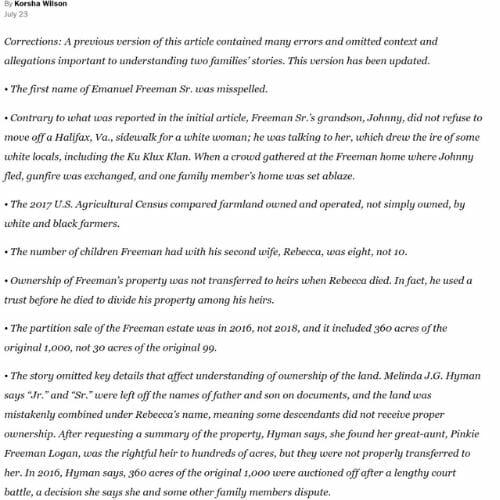Washington Post 'Embarrassed' by Error-Riddled Story That Required 15 Corrections
The Washington Post says it’s “embarrassed” that a story it published last month on black families’ struggles to keep their southern farmland required a whopping 15 corrections.
The feature article by freelance food writer Korsha Wilson, published July 23, is titled “Black families once lived off their southern farmland. Their descendants are struggling to hold onto it.”
There was just one problem — well, 15 of them.
“Corrections: A previous version of this article contained many errors and omitted context and allegations important to understanding two families’ stories,” a note at the top of the article read. “This version has been updated.”
Marty Baron, The Post’s executive editor, said in a statement to The Western Journal that the newspaper was embarrassed it had to issue so many corrections on one story.
“We are embarrassed by the widespread errors in this freelance article,” Baron’s statement read. “We have published a detailed correction of each error and updated the story based on re-reporting by Post staff.”
The types of errors varied, encompassing everything from a misspelling and inaccurate dates to the omission of “key details.”
The Post included a list of the corrections above the updated story:


Critics didn’t hold back in offering their thoughts on the error-filled story.
Why the world needs copy editors (and fact checkers), reason No. 1,000,000,002 and counting… https://t.co/eFtjqmwky7
— Nsikan Akpan (@MoNscience) August 7, 2019
They forgot the biggest correction:
*CORRECTION the @washingtonpost is not a news organization, it is a leftist propaganda rag. #FixedIt @realDailyWire https://t.co/GkAltmWRav
— B. West #sand (@BphWest1) August 8, 2019
This #WashingtonPost correction is brutal! 15 bullet-points worth, but no explanation of how this got through? Our #DemocracyDiesInDarkness newspaper has a little more ‘splainin’ to do. https://t.co/CMLyS46McG
— Kelly Terranova (@KellyIsFunny) August 8, 2019
According to one commentator, there are still plenty of questions The Post has yet to address regarding how the piece was published in the first place.
“The correction is certainly thorough with regard to the article’s content,” Washingtonian’s Andrew Beaujon wrote. “What it doesn’t answer, however, is any questions about the process this article went through and whether it was representative of how the Post handles contributions from freelancers whose training and propensity with regard to accuracy can be difficult to judge.”
“How many staffers contributed to reporting the correction, and how much of their time did it take up?” he added. “What’s the Post’s fact-checking process for freelancers like?”
“How and when did the Post learn that the story had so many problems? Who decided the correction needed to run on the front page of the Food section? Are there any legal dimensions to the correction? Would the Post work with Wilson again? Will this story occasion any changes to the Post’s process for working with freelancers? To Wilson, I would ask most of those same questions and add: Do you believe the Post treated you fairly?”
Truth and Accuracy
We are committed to truth and accuracy in all of our journalism. Read our editorial standards.












